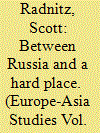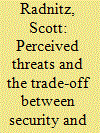| Srl | Item |
| 1 |
ID:
163416


|
|
|
|
|
| Summary/Abstract |
This essay asks how Central Asian states have responded to Russia’s intervention in Ukraine and salvos against the West, as a means to assess how Russia and the Central Asian states understand their national interests and exercise state power. It argues that the post-Soviet region shares a cynical and geopolitically driven view of the exercise of global power. Yet Russia has sometimes deployed its resources to advance short-term ideological objectives, whereas Central Asian foreign policy is pragmatic and opportunistic. The Ukraine crisis threatened to coerce the Central Asian states into conformity with Russia’s interests; ironically, their dependence on Russia has enabled their freedom of action in foreign policy, within limits. The essay highlights the ways that geography enables and constrains the execution of foreign policy, and considers the ambiguous role ideology plays in the formulation of national interests and the prospects for international cooperation.
|
|
|
|
|
|
|
|
|
|
|
|
|
|
|
|
| 2 |
ID:
163802


|
|
|
| 3 |
ID:
185189


|
|
|
|
|
| Summary/Abstract |
It is well established that exposure to threats causes citizens to prioritize security considerations and accept restrictions on civil liberties. Yet most studies on which these findings are based come from longstanding democracies and do not distinguish among types of threat. This article argues that the effects of internal and external threats are conditional on regime type. It tests the argument via an experiment embedded in an original survey of Georgia and Kazakhstan, countries that vary in regime type but face similar levels of threat. In authoritarian Kazakhstan, there is no difference in attitudes by threat type, whereas external threats produce greater support for security than internal ones in more pluralistic Georgia. Contrary to previous research, security preferences are not mediated by the triggering of anxiety. The findings contribute to literatures on the link between threats and authoritarian preferences, the rally-round-the-flag effect, and the ways that political institutions mediate psychological processes.
|
|
|
|
|
|
|
|
|
|
|
|
|
|
|
|
| 4 |
ID:
181822


|
|
|
|
|
| Summary/Abstract |
This article surveys research on regimes and states in Central Asia and assesses its contribution to Political Science, specifically the subfield of comparative politics. It discusses three areas in which research on the region has been influenced by and, in turn, fruitfully shaped the comparative political analysis of state and regime: a turn from macro- to micro-level topics; innovations in research design; and the embrace of interdisciplinarity. It then addresses the challenges confronting scholars of the region, including uneven theoretical contributions to comparative politics and impediments in the feasibility of field research. It identifies several lively debates in comparative politics to which Central Asianists have the potential to contribute important insights. It concludes that the study of states and regimes in Central Asia has greatly enriched some debates in comparative politics (and vice versa), but declining pools of funding, the politicization of academic research, and unequal access to institutional resources among local and Western scholars threaten to diminish the field’s contributions in the coming years.
|
|
|
|
|
|
|
|
|
|
|
|
|
|
|
|
| 5 |
ID:
075071


|
|
|
|
|
| Publication |
2006.
|
| Summary/Abstract |
This article investigates the micro-level considerations leading to the decision to migrate within the former Soviet Union. By conducting a survey and focus group of minorities in Tashkent, Uzbekistan, it specifies hypotheses from the theoretical literature on migration centred on political/national and economic factors and their interaction, and then tests them in the field. The results indicate that economic factors were of primary importance in explaining people's decisions and political factors were rarely sufficient to produce migration. Nation-building and everyday nationalism influenced migration decisions only insofar as they affected people's material well being, by creating language barriers and facilitating the preferential treatment of locals over minorities in receiving employment. The most decisive factor was the perception of overall economic decline that decreased people's standards of living and diminished their prospects for employment and opportunities for their children. Researchers must therefore pay more attention to the effects of structural decline on individual households and the interaction of political and economic factors in the decision to migrate.
|
|
|
|
|
|
|
|
|
|
|
|
|
|
|
|